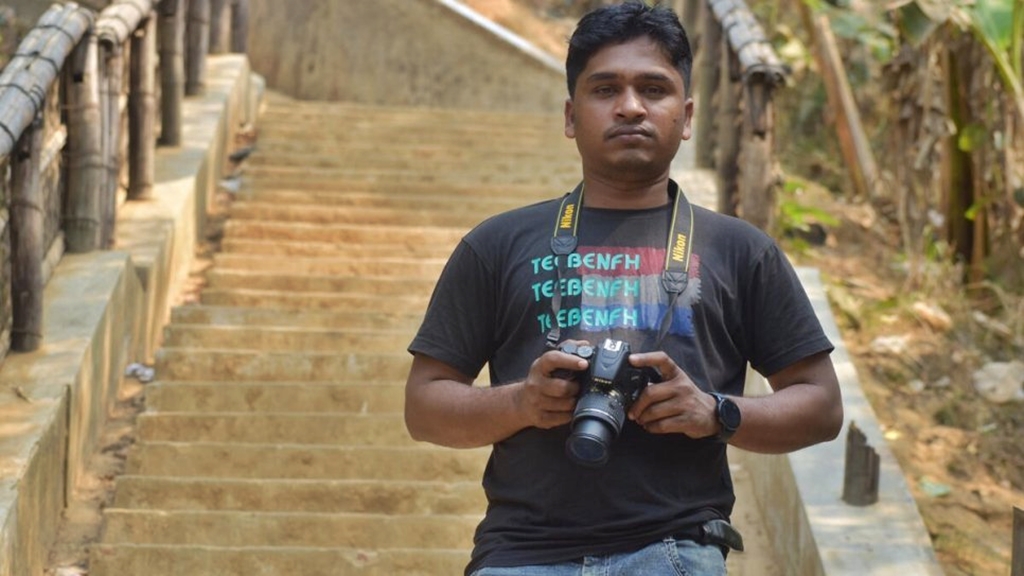
‘Rohingya delivering messages for Rohingya, to Rohingya. This is how we dreamed to have a film school’
- 18/05/2021
- 0
By Faruque Mohammed, UNHCR
The film school Rohingya refugee Faruque Mohammed co-founded is now delivering COVID information to refugee settlements in Cox’s Bazar.
Faruque Mohammed, 33, is a Rohingya refugee and co-founder of Omar’s Film School in Cox’s Bazar, Bangladesh. The informal school trains young Rohingya refugees on photography and videography so they can tell their own stories. Since the outbreak of COVID-19, the school has also dedicated itself to informing the refugee community about the virus. We talked to Faruque about how the film school came about and his hopes for the future.
I have been living in refugee camps [in Cox’s Bazar] since 1992 – I’ve spent almost my entire life in different camps. I cannot remember how my own family fled Myanmar because I was a little kid when my parents fled to Bangladesh.
I only studied to Grade 5 in a refugee camp school. I did not have proper schooling. But we felt like we needed to know English to let the world know how we are surviving here – our expectations, and how we should solve our problems. I used to read whatever I had, and I used to watch English movies. I learned by speaking to foreigners and to the people around me. I worked as a teacher in the refugee camp and interpreted sometimes for UN staff.
The vision and the inspiration to have this kind of film school started in 2017 when my brother, Omar, and I were working with media during the influx of Rohingya refugees. We saw a lot of journalists, a lot of people came with cameras and we approached them, we said: “I can speak English, I am a Rohingya, I know the situation. I can help you.” My brother and I worked as fixers for many international news organizations.
Omar worked a lot with Reuters photojournalists and his passion for photography and video grew and grew. He started learning from those he was working with, and Reuters also wanted to give him a camera to take photos in their absence. We taught ourselves from YouTube too, and later had online training from international photographers.
We were helping the Rohingya settle in the camp, and also interpreting for media interviews. I would introduce myself and say, “I am a Rohingya, I am your fellow brother, I am your son.” Then they expressed their real suffering to me. It was another kind of emotion they were expressing [in Rohingya] to what they could say in English.
What I felt and understood was that if a Rohingya delivered a message to another Rohingya, it’s very easy for them to understand; it’s very convincing. The idea was Rohingya delivering messages for Rohingya, to Rohingya. This is how we dreamed to have a film school for them.
View this post on Instagram
We hope to be the number one platform in the refugee camps working “for refugees by refugees”. By showing Rohingya culture through photos and videos and social media, we are preserving our heritage and giving public importance to it. We want to document our day-to-day lives, but also our struggles.
In March 2020, the first COVID-positive patient was identified in Bangladesh. Before that, there was news from around the world that COVID-19 was becoming a global pandemic and that people were dying. We were very frightened because we are living in a densely populated area. We do not have any scope for social distancing here.
View this post on Instagram
We thought we should share the real up-to-date information with our fellow Rohingyas. So, we took some information from WHO and we made some videos. We tried to share it by mobile-to-mobile, and we asked people to watch with their families.
Our friend Usman made a video and composed a song about COVID-19. It was really well received.
Informative song in Rohingya language on #COVID19 and it's preventive measures by #Rohingya singer Osman Goni.
Rohingya using their talent to arise awareness on Covid19 in camp.@IOMBangladesh @UNHCR_BGD @Refugees @MIJamjoom @3mpereira @CorlissUNHCR pic.twitter.com/7Gnc0D8yUS
— Omar's Film School (@omar_film) July 7, 2020
Not long after we started the film school, and started helping with COVID awareness, my brother Omar suddenly died. We still don’t know the cause. We renamed the school from the Rohingya Film School to Omar’s Film School to pay tribute to him and keep him alive in our activities.
When we see that people are watching our videos, maintaining social distance because of the information we tried to deliver to them, we feel very proud. When we see that youth, who took training from us, are taking photos and publishing on Facebook, Twitter, and some international news, we feel really proud of them. They are using their potential, using their skills.
I hope that one day we will be able to go back to our country in safety and dignity, and that we will no longer be discriminated against based on our religious and racial identity. We will be able to live in peace and contribute to our country’s development.
I want to do social work in Myanmar and promote peace between communities.






